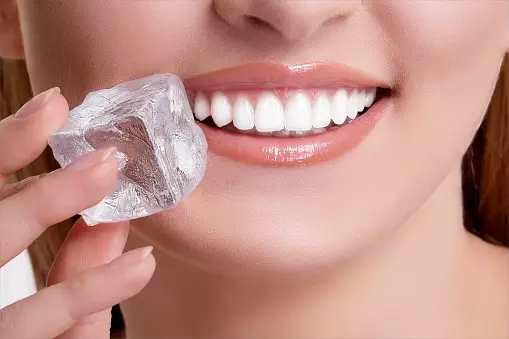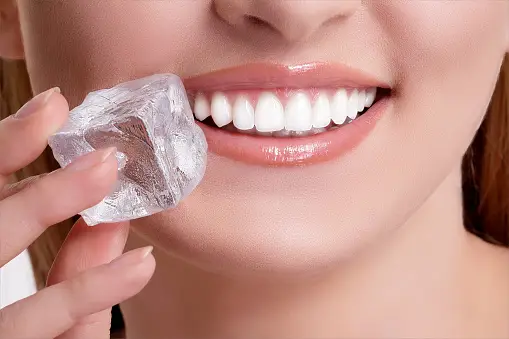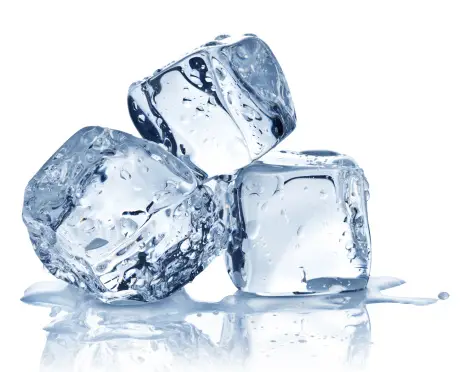
17 Sep Is Chewing Ice Bad For My Teeth?
Bad Chewing Habits Are Everywhere

Bad chewing habits can significantly damage teeth and oral health over time. Here are some common bad chewing habits and how they can harm your teeth:
Chewing on Non-Food Items (Pens, Pencils, etc.)
-
-
- Damage: Gnawing on non-food items can result in chipped or cracked teeth, worn-down enamel, and damage to dental restorations.
- Consequences: Common outcomes include tooth fractures, dental work repairs, and potential tooth infections.
-
Grinding or Clenching Teeth (Bruxism)
-
-
- Damage: Persistent teeth grinding or clenching can wear down enamel, leading to tooth sensitivity, flattened teeth, and even jaw pain.
- Consequences: Bruxism can cause dental problems, including cracked teeth, damaged restorations, and temporomandibular joint (TMJ) disorders.
-
Nail Biting
-
-
- Damage: Biting nails can chip or crack teeth, harm the jaw joint, and introduce bacteria from the nails into the mouth.
- Consequences: Chipped teeth, jaw discomfort, and an increased risk of infection are potential outcomes.
-
Using Teeth as Tools
-
-
- Damage: Using teeth to open bottles, tear open packaging, or perform other non-eating tasks can lead to chips, fractures, or even dislocation of teeth.
- Consequences: Tooth damage, pain, and the need for dental repairs are common consequences.
-
Excessive Snacking
-
-
- Damage: Constant snacking throughout the day exposes teeth to acids and sugars, increasing the risk of cavities.
- Consequences: Frequent snacking without proper oral hygiene can lead to tooth decay and gum problems.
-
Chewing Tobacco or Smoking
-
-
- Damage: Chewing tobacco and smoking can stain teeth, promote gum disease, and increase the risk of oral cancer.
- Consequences: Tooth discoloration, gum recession, and serious health issues, including oral cancer, are associated with tobacco use.
-
Excessive Consumption of Hard or Sticky Candies
-
-
- Damage: Hard candies can chip teeth, while sticky candies can adhere to tooth surfaces, promoting bacterial growth and cavities.
- Consequences: Dental caries (cavities), tooth fractures, and the need for dental fillings are common outcomes.
-
Crunching on Popcorn Kernels or Hard Foods
-
-
- Damage: Biting down on unpopped kernels or very hard foods can result in cracked or broken teeth.
- Consequences: Tooth fractures and the potential for dental work to repair the damage are risks associated with this habit.
-
Using Excessive Force When Brushing
-
- Damage: Brushing too vigorously with a hard-bristle toothbrush can erode enamel and damage gums.
- Consequences: Potential outcomes include tooth sensitivity, gum recession, and enamel erosion.
To maintain good oral health, it’s essential to identify and break these bad chewing habits. Regular dental check-ups can help detect and address dental issues early, and dentists can provide guidance on proper oral hygiene and behavior modification. Developing healthy habits, such as brushing and flossing regularly, wearing mouthguards for bruxism, and avoiding harmful behaviors, can go a long way in preserving your dental health and preventing costly dental procedures.

Chewing Ice
One of the biggest bad chewing habits that we did not discuss is chewing ice. Chewing ice is a common habit for many people, especially in hot summer or when sipping a refreshing beverage. While it may seem harmless, there is an ongoing debate about whether chewing ice is detrimental to dental health.
The Temptation of Chewing Ice
Chewing ice can be an irresistible habit for some individuals. The satisfying crunch and the cooling sensation can provide momentary relief and pleasure, especially during scorching weather or moments of stress. However, beneath this seemingly harmless habit lurk potential dangers to your teeth.
The Structure of Teeth
To understand the potential harm of chewing ice, it’s essential to grasp the structure of teeth. Teeth consist of three main layers: enamel, dentin, and pulp. The outermost layer, enamel, is the hardest substance in the human body, serving as a protective shield for the underlying layers.
The Dangers of Chewing Ice
- Enamel Damage
One of the primary concerns associated with chewing ice is enamel damage. Enamel is resilient, but it is not indestructible. Chewing on hard, frozen ice can lead to microcracks in the enamel. Over time, these microcracks can accumulate and weaken the enamel, making your teeth more susceptible to other forms of damage, such as cavities and sensitivity.
- Tooth Fractures
In addition to microcracks, chewing ice poses a risk of more significant tooth fractures. Ice is extremely hard, and the pressure applied when biting down on ice cubes can exceed the tooth’s capacity to withstand it. This can result in chipped or cracked teeth, which may require dental procedures to repair.
- Dental Fillings and Restorations
Chewing ice can be even riskier if you have dental fillings, crowns, or other restorations. These dental materials are not as strong as natural teeth and are more prone to damage from chewing on hard objects. Chewing ice can lead to the loosening or dislodging of dental restorations, requiring costly repairs.
- Tooth Sensitivity
Chewing ice can cause tooth sensitivity, particularly when the enamel becomes compromised. The microcracks in the enamel can expose the underlying dentin, which contains tiny tubules that connect to the nerves of the tooth. Hot or cold temperatures can trigger discomfort and pain when these tubules are exposed.
- Increased Risk of Tooth Decay
Weakened enamel, coupled with the potential for tooth sensitivity, can increase the risk of tooth decay. Enamel serves as a protective barrier against harmful bacteria and acids that can erode teeth and lead to cavities. When the enamel is compromised, these threats become more potent.
Alternatives to Chewing Ice
If you find yourself tempted to chew on ice, consider healthier alternatives to satisfy your cravings for a cool and crunchy sensation:
- Crushed Ice: Instead of chewing whole ice cubes, try crushing them into smaller pieces. This reduces the risk of damaging your teeth and makes it less likely for dental issues to develop.
- Chilled Snacks: Opt for chilled snacks like frozen grapes, berries, or banana slices. These can provide a refreshing and crunchy experience without the risks associated with ice cubes.
- Sugar-Free Gum: Sugar-free gum can be a suitable alternative for those who enjoy the act of chewing. It stimulates saliva production, which helps cleanse the mouth and strengthen teeth.
- Dental-Friendly Beverages: Choose beverages that are not overly cold or hot, as extreme temperatures can exacerbate tooth sensitivity. Sipping on water or herbal teas can be a better option for your dental health.
- Consult a Dentist: If you find it challenging to curb your ice-chewing habit, consider consulting your dentist. They can provide personalized advice and strategies to help you break the habit and maintain healthy teeth.
Resist The Temptation
While bad habits can be easy to adopt, it’s important to remember that they are not set in stone. With awareness, commitment, and the right strategies, it’s possible to break and replace these habits with healthier ones. Here are some tips for overcoming bad habits:
- Self-Awareness: Recognize your bad habits and understand why you engage in them. Identifying triggers and underlying reasons can help you address the root causes.
- Set Clear Goals: Define specific, achievable goals for breaking the habit. Having a clear target in mind can keep you motivated.
- Seek Support: Share your goals with friends, family, or a support group. Having a support system can provide encouragement and accountability.
- Replace with Positive Habits: Replace the bad habit with a healthier alternative. For example, if you’re trying to quit smoking, consider chewing sugar-free gum when you have a craving.
- Practice Mindfulness: Mindfulness techniques can help you become more aware of your actions and impulses, making it easier to resist the habit.
- Reward Progress: Celebrate your successes along the way. Small rewards can reinforce positive behavior change.
- Seek Professional Help: If the habit is particularly challenging or addictive, consider consulting a therapist or counselor who specializes in habit change.
While the temptation to chew ice may be strong, it is essential to consider the potential risks to your dental health. Chewing ice can lead to enamel damage, tooth fractures, sensitivity, and an increased risk of tooth decay. To protect your teeth, explore healthier alternatives and consult your dentist if you need assistance in breaking this habit. Ultimately, safeguarding your dental health should be a priority, and making informed choices about what you put in your mouth is a crucial step toward maintaining a beautiful and healthy smile.



Sorry, the comment form is closed at this time.